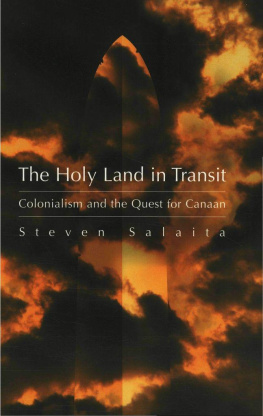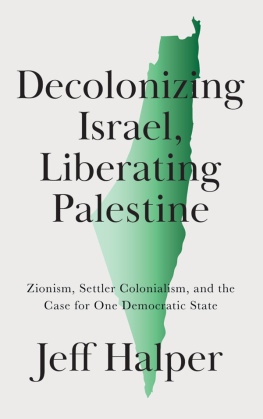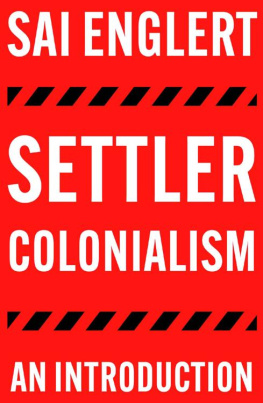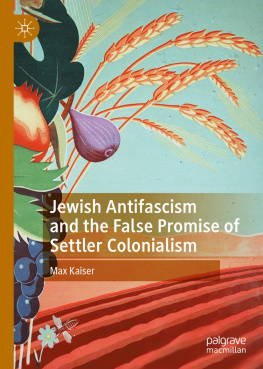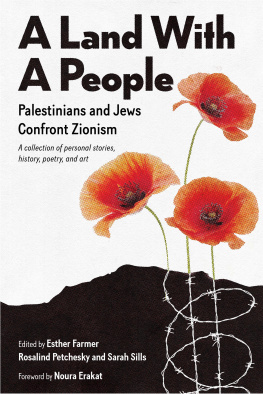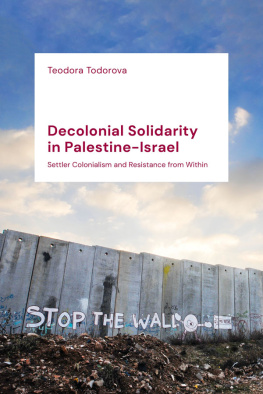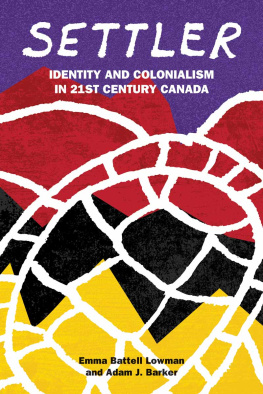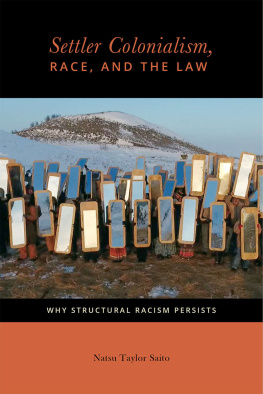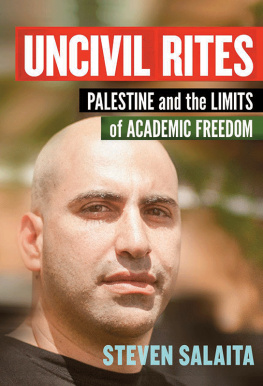The Holy Land in Transit
Middle East Studies Beyond Dominant Paradigms
Peter Gran, Series Editor
OTHER TITLES IN MIDDLE EAST STUDIES
BEYOND DOMINANT PARADIGMS
Family and Court: Legal Culture
and Modernity in Late Ottoman Palestine
IRIS AGMON
In Praise of Books: A Cultural History of Cairo's Middle Class,
Sixteenth to the Eighteenth Century
NELLY HANNA
Islamic Roots of Capitalism: Egypt, 17601840
PETER GRAN
Making Big Money in 1600: The Life and Times
of lsma'il Abu Taqiyya, Egyptian Merchant
NELLY HANNA
The New Mamluks: Egyptian Society and Modern Feudalism
AMIRA EL-AZHARY SONBOL
The Holy Land in Transit
Colonialism and the Quest for Canaan
Steven Salaita
With a Foreword by Peter Gran

SYRACUSE UNIVERSITY PRESS
Copyright 2006 by Syracuse University Press
Syracuse, New York 132445160
All Rights Reserved
First Edition 2006
06 07 08 09 10 11 5 4 3 2 1
Library of Congress Cataloging-in-Publication Data
Salaita, Steven George, 1975
The Holy Land in transit: colonialism and the quest for Canaan / Steven Salaita ; with a foreword by Peter Gran.1st ed. p. cm.(Middle East studies beyond dominant paradigms) Includes bibliographical references and index.
ISBN 0815631251 (hardcover : alk. paper)ISBN 081563109-X (pbk.: alk. paper)
1. Colonies in literature. 2. Arab-Israeli conflict in literature. 3. Postcolonialism in literature. 4. Indians in literature. 5. Ojibwa IndiansCultural assimilation. I. Gran, Peter, 1941 - II. Title.
PN56.C63S25 2006
809'.93358dc22 2006021116
Manufactured in the United States of America
Contents
| PETER GRAN
Steven Salaita teaches as assistant professor in the English Department at Virginia Tech. He also serves as executive director of the Radius of Arab American Writers, Incorporated (RAWI) and is the author of two other books, Anti-Arab Racism in the USA and Arab American Literary Fictions, Cultures, and Politics.
Foreword
IT HAS BEEN DIFFICULT to effectively criticize the Hegelian view of history up to this point in time. Most scholars as a result simply continue to Middle Easternize the Middle East, repeating by implication the old East and West of earlier writing. And this practice has not been for want of trying to break free from the tradition on the part of many different scholars. One attempt that rose and fell to a degree was that of the settler colonialism model. It originally was applied to the situation of Israel/Palestine by writers such as the late Maxime Rodinson, and its applicability to other cases was detected by a number of other writers, probably most recently in the works of Ian Lustick.
The settler colonial model explained in a sense how a community could make a new beginning in a new land and, free from much of the past, embrace democracy, doing so however at a very high cost of embracing at the same time the crimes of those who procured the land that became the new country. This model would explain, as various writers have pointed out, the basis of Chosen People-ism, the attraction to the story of Moses and Exodus and much else.
A certain strand of American studies concerned with Amerindian issues has picked up this paradigm and has made some use of it, and certainly there are features of American history that lend themselves to this kind of interpretation.
At the same time, I believe we are considerably past the heyday of this paradigm, judging from trends in recent Western language scholarship. Why this might be the case could be explained in larger terms. First, the Hegelian paradigm has a way of beating down its challengers up until now, as it has been doing for more than a century. Second, the concern with colonialism and national origins is not as central as it once was. The whole discussion of the nation-state at this point has to compete for attention with the claims of globalization. To the extent that the paradigm lives on, it is in Third World scholarship where the paradigm fits with the ongoing concern about what is taken to be neocolonialism.
For Israel, the transition between older and newer concerns was apparent following the 1967 war, an event now nearly forty years in the past. At that point fundamental choices were made that have guided the country until now, among them to allow for a Green Line Palestinian community as part of the country distinct from the occupied territories of the West Bank and Gaza. After that pointthat is, 1967Israel emerged as a modern welfare state in a global setting, its settler past somewhat in the background.
Professor Salaita's work marks a revival of the settler colonial paradigm in several ways. First, by considering Palestinian and Amerindian writers, Professor Salaita points to something that was never pursued by the earlier generation of writers who made use of this paradigm: the comparability of the indigenous inhabitants given the similarity of the experiences that befell them. This comparison may have been assumed but to my recollection the earlier generation mainly concentrated on the comparability of the dominant cultures and not on its victims. Second, Professor Salaita overcomes what for me was a major issue, that of the paradigm being out of date. What the book shows is that contemporary Amerindian and Palestinian writers, individuals who are highly unlikely to have much mutual contact, retain their comparability even now, suggesting that it would be relevant to think about bringing the paradigm as a whole up to date rather than scuttling it. Third, Professor Salaita as a literary critic obliges us to think about literature as a source or a way of getting at a subject long thought to be a part of political science or political philosophy. True, Fanon and Memmi wrote about the culture of settler states, but in their studies culture was made to serve political science while here it is not.
Peter Gran
January 2006
Acknowledgments
I AM DEEPLY GRATEFUL to my former graduate adviser, Alan Velie, for his patience and insight when this book first saw life some years back as a dissertation. I am equally grateful to Daniel Cottom, a uniquely brilliant and generous scholar to whom I owe many successes; to Catherine John, whose insight into colonial dynamics remains unequaled; and to Robert Warrior, a gifted teacher who believed in the veracity of this project from its outset, even when others doubted its plausibility.
I also wish to thank James Treat, Janet McAdams, Hilton Obenzinger, Joshua Landis, Nicholle Dragone, and Eric Hooglund. As always, my familyespecially Diana, who puts up daily with my frequent ruminations and idiosyncratic scheduledeserves a huge word of appreciation.
Special thanks are due to the people of Shatila Refugee Camp in Lebanon for their remarkable hospitality.
Were there an award for World's Best Editor, Mary Selden Evans would certainly deserve the honor.
Finally, portions of this book were published in previous incarnations as journal articles. "Digging up the Bones of the Past: Colonial and Indigenous Interplay in Winona LaDuke's Last Standing Woman" appeared in American Indian Culture and Research Journal 26 (2002); "Demystifying the Quest for Canaan: Observations on Mimesis in the New World and Holy Land" appeared in Critique: Critical Middle Eastern Studies 11 (2002); and "The Kahan Commission Report and A Balcony Over the Fakihani: A Tale of Two Fictions" appeared in
Next page
